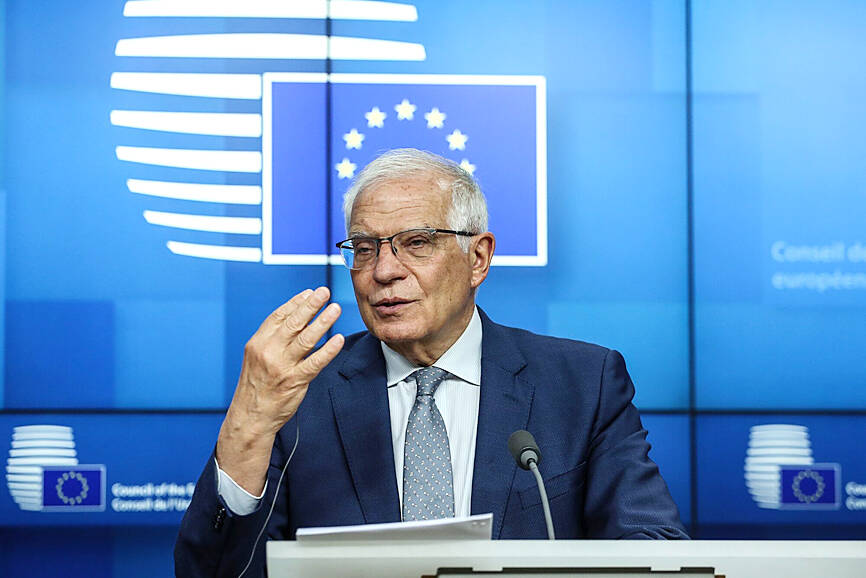EU High Representative for Foreign Affairs and Security Policy Josep Borrell called on European navies to patrol the Taiwan Strait, in an opinion article published in a French weekly yesterday.
Borrell’s comments in Le Journal du Dimanche echoed comments he made last week when he stressed how crucial Taiwan is to Europe.
He said that Taiwan “concerns us economically, commercially and technologically.”

Photo: Bloomberg
“That’s why I call on European navies to patrol the Taiwan Strait to show Europe’s commitment to freedom of navigation in this absolutely crucial area,” he added.
Two weeks ago, China launched three days of military exercises around Taiwan — simulating targeted strikes and a blockade of the nation — in response to a meeting between President Tsai Ing-wen (蔡英文) and US House of Representatives Speaker Kevin McCarthy.
On Tuesday, in a speech opening a debate on China at the European Parliament, Borrell talked about Taiwan’s importance to Europe.
“Taiwan is clearly part of our geostrategic perimeter to guarantee peace,” he said.
“It is not only for a moral reason that an action against Taiwan must necessarily be rejected. It is also because it would be, in economic terms, extremely serious for us, because Taiwan has a strategic role in the production of the most advanced semiconductors,” he said.
His comments came after French President Emmanuel Macron earlier this month argued that Europe should not be a “follower” of Washington or Beijing in the event of conflict with China over Taiwan.
Macron’s comments, following a visit to China, sparked criticism from some politicians in the US and inside the EU.
In Taipei, the Ministry of Foreign Affairs yesterday thanked the EU for repeatedly underlining the importance of peace and stability across the Taiwan Strait.
The EU shows that it values and supports Taiwan by opposing any unilateral change to the cross-strait “status quo” and stressing that Taiwan is crucial to Europe’s geostrategic interests for its role in the semiconductor supply chain and maintaining regional peace, the ministry said in a statement.
As a key member of the Indo-Pacific region, Taiwan will continue to deepen ties with like-minded democratic partners, enhance key supply chain resilience and safeguard regional peace, stability and prosperity, it added.
Additional reporting by Sally Liu

Intelligence agents have recorded 510,000 instances of “controversial information” being spread online by the Chinese Communist Party (CCP) so far this year, the National Security Bureau (NSB) said in a report yesterday, as it warned of artificial intelligence (AI) being employed to generate destabilizing misinformation. The bureau submitted a written report to the Legislative Yuan in preparation for National Security Bureau Director-General Tsai Ming-yen’s (蔡明彥) appearance before the Foreign Affairs and National Defense Committee today. The CCP has been using cognitive warfare to divide Taiwanese society by commenting on controversial issues such as Taiwan Semiconductor Manufacturing Co’s (TSMC, 台積電) investments in the

INVESTIGATION: The case is the latest instance of a DPP figure being implicated in an espionage network accused of allegedly leaking information to Chinese intelligence Democratic Progressive Party (DPP) member Ho Jen-chieh (何仁傑) was detained and held incommunicado yesterday on suspicion of spying for China during his tenure as assistant to then-minister of foreign affairs Joseph Wu (吳釗燮). The Taipei District Prosecutors’ Office said Ho was implicated during its investigation into alleged spying activities by former Presidential Office consultant Wu Shang-yu (吳尚雨). Prosecutors said there is reason to believe Ho breached the National Security Act (國家安全法) by leaking classified Ministry of Foreign Affairs information to Chinese intelligence. Following interrogation, prosecutors petitioned the Taipei District Court to detain Ho, citing concerns over potential collusion or tampering of evidence. The

‘COMPREHENSIVE PLAN’: Lin Chia-lung said that the government was ready to talk about a variety of issues, including investment in and purchases from the US The National Stabilization Fund (NSF) yesterday announced that it would step in to staunch stock market losses for the ninth time in the nation’s history. An NSF board meeting, originally scheduled for Monday next week, was moved to yesterday after stocks plummeted in the wake of US President Donald Trump’s announcement of 32 percent tariffs on Taiwan on Wednesday last week. Board members voted to support the stock market with the NT$500 billion (US$15.15 billion) fund, with injections of funds to begin as soon as today. The NSF in 2000 injected NT$120 billion to stabilize stocks, the most ever. The lowest amount it

NEGOTIATIONS: Taiwan has good relations with Washington and the outlook for the negotiations looks promising, Minister of Economic Affairs J.W. Kuo said Taiwan’s GDP growth this year is expected to decrease by 0.43 to 1.61 percentage points due to the effects of US tariffs, National Development Council (NDC) Minister Paul Liu (劉鏡清) said at a meeting of the legislature’s Economics Committee in Taipei yesterday, citing a preliminary estimate by a private research institution. Taiwan’s economy would be significantly affected by the 32 percent “reciprocal” tariffs slapped by the US, which took effect yesterday, Liu said, adding that GDP growth could fall below 3 percent and potentially even dip below 2 percent to 1.53 percent this year. The council has commissioned another institution